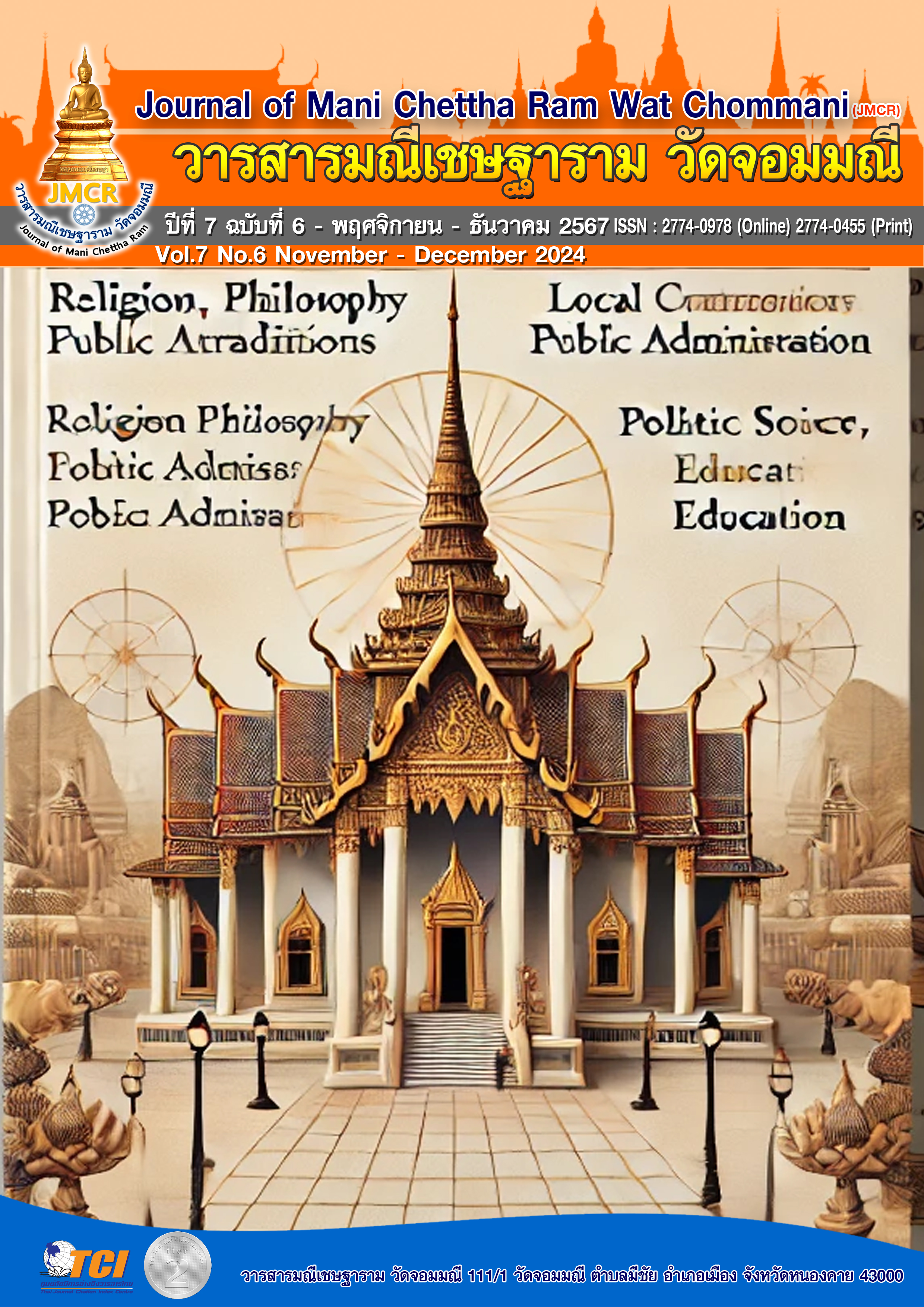SPECIAL CLASSROOM PROJECT MANAGEMENT OF SCHOOL UNDER THE SECONDARY EDUCATIONAL SERVICE AREA OFFICE NONTHABURI
Keywords:
School administrators, Management, Special classroom projectAbstract
The objectives of this research were 1) to study the special classroom project management of school under The Secondary Educational Service Area Office Nonthaburi, and 2) to compare the opinions of teachers on the special classroom project management of schools under The Secondary Educational Service Area Office Nonthaburi classified by gender, age, education level, and work experience. The sample consisted of 297 teachers by selected through simple random sampling. The research instrument was a questionnaire with content validity, IOC values between .67-1.00 and a reliability value of .99. The data were analyzed by using frequency, percentage, mean, standard deviation, t-test, One-way ANOVA, and LSD.
The results of the research were as follows: 1) the special classroom project management of school under The Secondary Educational Service Area Office Nonthaburi was at a high level in overall and particular aspects, ranking from the highest to the lowest mean: Process, Input and Output, and 2) the opinions of teachers on the special classroom project management of schools under The Secondary Educational Service Area Office Nonthaburi classified by gender and education level were not different in overall, while the differential age and work experience were statistically significant at the level of .01 in overall, and particular aspects, except for Process
References
กระทรวงศึกษาธิการ. (2545). พระราชบัญญัติการศึกษาแห่งชาติ พ.ศ.2542 แก้ไขเพิ่มเติม (ฉบับที่ 2 พ.ศ. 2545). กรุงเทพมหานคร: สำนักนายกรัฐมนตรี.
กระทรวงศึกษาธิการ. (2562). พระราชบัญญัติการศึกษาแห่งชาติ พ.ศ.2542 แก้ไขเพิ่มเติม (ฉบับที่ 4) พ.ศ. 2562. กรุงเทพมหานคร: โรงพิมพ์องค์การรับส่งสินค้าและพัสดุภัณฑ์
กมลวรรณ คุณาสวัสดิ์. (2561). แนวทางการบริหารและการจัดการแหล่งเรียนรู้ที่ส่งเสริมการจัดการเรียนการสอนของโรงเรียนปิยะพรพิทยา. ใน การศึกษาอิสระปริญญามหาบัณฑิต. เชียงราย: มหาวิทยาลัยราชภัฏเชียงราย.
กฤษฎา เจริญวัย. (2564). การบริหารจัดการการศึกษาเพื่อพัฒนาคุณภาพการเรียนการสอนในสถานศึกษา. กรุงเทพมหานคร: สำนักพิมพ์มหาวิทยาลัยศิลปากร.
ชยพล พานิชเลิศ. (2564). การเตรียมผู้เรียนสำหรับการศึกษาต่อและการพัฒนาทักษะชีวิตในสังคมปัจจุบัน. กรุงเทพมหานคร: สำนักพิมพ์มหาวิทยาลัยราชภัฏสวนสุนันทา.
นัฐนิตย์ วงษ์สันต์. (2564). บทบาทของผู้บริหารสถานศึกษาตามความคิดเห็นของครูต่อการบริหารจัดการห้องเรียนพิเศษ MEP สังกัดสํานักงานเขตพื้นที่การศึกษามัธยมศึกษา เขต 6. สิกขา วารสารศึกษาศาสตร์, 8(2), 108-117.
ประยงค์ ศรีโทมี. (2561). การบริหารจัดการและการมีส่วนร่วมในองค์กร. กรุงเทพมหานคร: สำนักพิมพ์มหาวิทยาลัยรามคำแหง.
พระปลัดสมควร ปญฺญาวชิโร (ปลื้มสุด). (2561). การพัฒนาคุณภาพการศึกษาในสถานศึกษา: บทบาทของผู้บริหารในยุคดิจิทัล. กรุงเทพมหานคร: สำนักพิมพ์มหาวิทยาลัยมหาจุฬาลงกรณราชวิทยาลัย.
ลัดดาวัลย์ เพชรโรจน์ และคณะ. (2562). สถิติสำหรับการวิจัยเทคนิคการใช้ SPSS (ฉบับปรับปรุง ครั้งที่ 3). กรุงเทพมหานคร: เจริญดีมั่นคงการพิมพ์.
สิริกานต์ ทิพย์ภักดี และทวีศิลป์ กุลนภาดล. (2565). การบริหารจัดการห้องเรียนพิเศษในโรงเรียนระดับการศึกษาขั้นพื้นฐานของจังหวัดอ่างทอง. วารสารบริหารการศึกษา มศว, 19(36), 39-51.
สำนักงานเขตพื้นที่การศึกษามัธยมศึกษานนทบุรี. (2565). รายงานการเปิดโครงการห้องเรียนพิเศษในโรงเรียน. นนทบุรี: สำนักงานเขตพื้นที่การศึกษามัธยมศึกษานนทบุรี.
สำนักงานเขตพื้นที่การศึกษามัธยมศึกษานนทบุรี. (2566). แผนปฏิบัติการประจำปีงบประมาณ พ.ศ. 2566. กลุ่มนโยบายและแผน: สำนักงานเขตพื้นที่การศึกษามัธยมศึกษานนทบุรี.
Brennan, J., & Osborne, M. (2008). Higher Education’s Many Diversities: of Students, Institutions and Experiences, and Outcomes?. Research Papers in Education, 23, 179-190.
Krejcie, R. V., & Morgan, D. W. (1970). Determining sample size for research activities. Educational and Psychological Measurement, 30(3), 607–610.
Evertson, C. M., & Weinstein, C. S. (Eds.). (2006). Handbook of classroom management: Research, practice, and contemporary issues. New York: Routledge.
Dorman, J. P. (2003). Relationship between school and classroom environment and teacher burnout: A LISREL analysis. Social Psychology of Education. (6),107–127.




